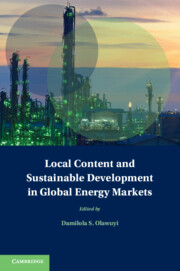Book contents
- Local Content and Sustainable Development in Global Energy Markets
- Reviews
- Treaty Implementation for Sustainable Development
- Local Content and Sustainable Development in Global Energy Markets
- Copyright page
- Contents
- Preface and Acknowledgements
- Abbreviations
- Editor
- Contributors
- Part I Introductory Context and Principles
- Part II Case Studies
- 6 Expressing Local Content through Black Economic Empowerment in the South African Petroleum Industry
- 7 Local Content Frameworks for Petroleum Industry Operations in the CEMAC Region: An Evaluation of Their Functionality, Sustainability and Normative Underpinnings
- 8 Local Content, Angolanização, and Sustainable Development in Angola
- 9 Local Content and the Sustainable Development of Oil and Gas Resources in Nigeria
- 10 Local Content Requirements and Treaty Implementation in Kenya’s Petroleum Sector
- 11 Sustainability and Local Content Requirements in Australian Oil and Gas Development: Has the Ship of Opportunity Sailed?
- 12 Local Content for Sustainable Development in Middle East and North Africa: Current Legal Approaches and Future Directions
- 13 Local Content and Sustainable Development in Norway
- 14 Local Content and Sustainable Development in Argentina
- 15 The Latin American Experience in Designing Local Content Policies in the Oil and Gas Sectors: Strengths, Limitations, and Future Perspectives
- 16 Local Content and Sustainable Development in Brazil
- 17 Industrial Policy and Local Content Rules in US Energy Policy
- 18 Oil and Gas Sector Local Content Decision Processes: Canadian Indigenous Participation
- Part III Lessons Learned and Future Directions
- Index
9 - Local Content and the Sustainable Development of Oil and Gas Resources in Nigeria
from Part II - Case Studies
Published online by Cambridge University Press: 05 March 2021
- Local Content and Sustainable Development in Global Energy Markets
- Reviews
- Treaty Implementation for Sustainable Development
- Local Content and Sustainable Development in Global Energy Markets
- Copyright page
- Contents
- Preface and Acknowledgements
- Abbreviations
- Editor
- Contributors
- Part I Introductory Context and Principles
- Part II Case Studies
- 6 Expressing Local Content through Black Economic Empowerment in the South African Petroleum Industry
- 7 Local Content Frameworks for Petroleum Industry Operations in the CEMAC Region: An Evaluation of Their Functionality, Sustainability and Normative Underpinnings
- 8 Local Content, Angolanização, and Sustainable Development in Angola
- 9 Local Content and the Sustainable Development of Oil and Gas Resources in Nigeria
- 10 Local Content Requirements and Treaty Implementation in Kenya’s Petroleum Sector
- 11 Sustainability and Local Content Requirements in Australian Oil and Gas Development: Has the Ship of Opportunity Sailed?
- 12 Local Content for Sustainable Development in Middle East and North Africa: Current Legal Approaches and Future Directions
- 13 Local Content and Sustainable Development in Norway
- 14 Local Content and Sustainable Development in Argentina
- 15 The Latin American Experience in Designing Local Content Policies in the Oil and Gas Sectors: Strengths, Limitations, and Future Perspectives
- 16 Local Content and Sustainable Development in Brazil
- 17 Industrial Policy and Local Content Rules in US Energy Policy
- 18 Oil and Gas Sector Local Content Decision Processes: Canadian Indigenous Participation
- Part III Lessons Learned and Future Directions
- Index
Summary
Nigeria offers a classic example of how lack of effective safeguards on anti-corruption, accountability, and transparency may hinder the sustainable development aims of local content policies. Based on the fundamental premise that petroleum resources, as well as its accruing benefits, belong to the Nigerian people, Nigeria has designed some of the most comprehensive local content laws and requirements (LCRs) in the world. However, in reality, the core precepts of Nigeria’s LCRs have not fully translated to increased economic and social benefits for Nigerian workers and industries, especially those in the oil producing communities.
This chapter evaluates the efficacy of the local content regime in Nigeria. It identifies legal, institutional, and practical challenges that hinder the full attainment of the intended sustainable development objectives of the Nigerian local content regime. These include corruption and lack of transparency in the monitoring of LCRs; unaddressed skills and capacity gaps of intended beneficiaries of LCRs; lack of financing for domestic companies; lack of coherent integration of Nigerian LCRs and national sustainable development plans; as well as gender inequalities in the oil and gas sector. The chapter then discusses a wide array of solutions that can help maximize the sustainable development potential of Nigerian LCRs. These reforms include the need to: implement anti-corruption and whistle blowing initiatives in the Nigerian oil and gas sector; improve the coherent enforcement of relevant laws providing for LCRs and sustainable development plans (SDPs); create specialized training schools for skills acquisition for Nigerians in the oil and gas industry to enhance local content; as well develop a sustainable roadmap for addressing gender gaps in the Nigerian oil and gas industry.
- Type
- Chapter
- Information
- Publisher: Cambridge University PressPrint publication year: 2021

